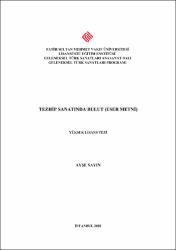Tezhip Sanatında Bulut (Eser Metni)
Citation
SAYIN, Ayşe, Tezhip Sanatında Bulut (Eser Metni), Fatih Sultan Mehmet Vakıf Üniversitesi Lisansüstü Eğitim Enstitüsü Geleneksel Türk Sanatları Anasanat Dalı, Yayımlanmamış Yüksek Lisans Tezi, İstanbul 2020.Abstract
Tezhip yazma eser, levha ve murakkaların tezyînâtında kullanılan kitap sanatlarının
önemli bir dalını teşkil eden bezeme sanatlarımızdandır. Kitap sanatı olarak zuhur edip
gelişmiş ve XVII. yy.'da Hafız Osman’ın hilyesi ile levhalara taşınmıştır. Zarafeti ve
ışıltısıyla günümüzde de tezyînî sanatlar içindeki müstesna yerini korumaktadır.
Her devletin kendine has bir bezeme anlayışı vardır. Göçler, savaşlar ve diğer
sebeplerden dolayı kültürler arası etkileşimler tezhip sanatının gelişmesine ve farklı
üslûpların ortaya çıkmasına vesîle olmuştur. Türkler de bu vesîlelerle kendi özünü korumak
sûretiyle farklı olanı almış ve kendilerine has bir üslûpla yorumlayarak sanatlarına dâhil
etmişlerdir. Bu çalışmanın konusunu teşkil eden bulut motifi de bu şekilde tezyînâtımıza
girmiş ve XV. yy.’dan sonra verilen eserlerde kompozisyonları zenginleştiren ve severek
kullanılan bir bezeme unsuru haline gelmiştir.
Osmanlı da “samimiyet, mantık ve sâdelik” esaslarını taşıyan kendine has bir
tezyînât üslûbu geliştirip sanata verdiği ehemmiyetle sanat anlayışını en ileri seviyeye
taşımıştır. Hazırlanan tezde, bu esaslar benimsenerek oluşturulan altı adet eser uygulaması
bulunmaktadır. Tezhip sanatındaki temel kâideler korunarak desen, kurgu ve bulut motifine
yeni bir bakış açısı kazandırmak bu uygulamaların ana fikrini oluşturmaktadır. Illumination is a decorative art, which constitutes an important branch of book arts
used in the decoration of manuscript, plates and muraqqa. Over the centuries, illumination
has gained a variety of styles and rich motifs with the governors’ appreciation of art. It
emerged and developed as a book art and was migrated to the plates with the Hilye of Hafiz
Osman in the 17th century.
With its elegance and glamour, it still preserves its distinguished place in decorative
arts today. Each state has its own unique decoration style. Intercultural interactions that are
caused by immigrations, wars and other reasons have led to the development of the
illumination art and the emergence of different styles. Given these circumstances, the Turks
incorporated different styles by preserving the essence of their art by interpreting them in a
unique style. The cloud motif, which is the subject of this study, was also included in our
decoration and became an element of decoration that enriches the compositions in the works
given after the 15th century.
In the Ottoman Empire, decorative artists developed a unique decoration style which
contains the principles of "sincerity, logic and simplicity" and has elevated the understanding
of art to the highest level. In this thesis, there are six work practices created by adopting
these principles. Bringing a new point of view to the pattern, design and cloud motif by
preserving the basic principles in the art of illumination constitutes the main idea of these
applications.



















